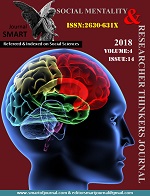Author :
Abstract
Keywords
Abstract
Nowadays it is a big dilemma if international trade carries external risks or not. Many domestic economies had risks against the USA tariff decisions. That shocks affect the real economy in a speculative way. In this study, the effect of globalization on public expenditures is investigated. Efficiency hypothesis advocates that globalization decreases government expenditures while compensation hypothesis advocates that relationship between globalization and government expenditures is positive with a different argument. In this study, The Validity of Efficiency and Compensation Hypothesis will be analyzed in order for BRICS-T for the period 1989-2016. According to test results, for Russia and India, the government expenditures seems to depend on trade openness.
Keywords
- Alesina, A. & Wacziarg, R. (1998). “Openness, Country Size and the Government”, Journal of Public
- Alesina, A. & Wacziarg, R. (1998). “Openness, Country Size and the Government”, Journal of Public Economics, 69:305–322.
- Atalay,A. & Aysu,A.(2013).“Etkinlik ve Telafi Edici Etki Hipotezi: Seçilmiş Ülkeler Üzerine Ampirik Bir İnceleme”, TİSK Akademi, 1:130-154
- Bayat, T., Tas, S. & Tasar I. (2017). "Energy Consumptıon Is A Determınant Of Economıc Growth In Brıcs Countrıes Or Not?, Asian Economic and Financial Review, 7(8):823-835.
- Bretschger, L. & Hettich, F. (2002). “Globalization, Capital Mobility and Tax Competition: Theory and Evidence for OECD Countries”, European Journal of Political Economy. 18:695–716.
- Busemeyer, M. R. (2009). “From Myth to Reality: Globalization and Public Spending in OECD Countries Revisited”, European Journal of Political Research. 48:445-482.
- Cameron D. (1978). “The expansion of the public economy: a comparative analysis”, The American Political Science Review, 72:1243-1261.
- Crepaz M.,(1998).“Inclusion vs. Exculusion Political Institutionsand the Welfare State”, Comparative Politics. 31:61-80
- Emirmahmutoğlu, F. & Kose, N. (2011). “Testing For Granger Causality İn Heterogeneous Mixed Panels”, Economic Modelling, 28: 870-876.
- Epifani, P. & Gancia, G. (2005). “On Globalization and the Growth of Governments”, Conference Political and Institutional Constraints to Growth: Lessons for the European Union, Florence
- Erauskin, I. (2010).“Financial Openness, Volatility and the Size of Productive Government”, Journal of the Spanish Economic Association.
- Garrett, G.(2001). “Globalizationand Grovernment Spendingaround the Word” Studies in Comparative International Developmend 35(4):3-29
- Garret, G. & Mitchell, D. (2001). “Globalization, Government Spending and Taxation in the OECD”, European Journal of Political Research, 39:145–177
- Gemmell,N., Kneller R. & Sanz, I. (2008). “Foreign Investment, International Trade and the Size and Structure of Public Expenditures”, European Journal of Political Economy. 24:151–171.
- Jeanneney, S.G. & Hua ,P.(2004). “Why Do More Open Chinese Provinces Have Bigger Governments?”, Reviev of international Economics, 12(3):525-542
- Kayhan, S., Bayat, T, & Ugur, A. (2013). “Interest Rates and Exchange Rate Relationship in BRIC- T Countries”. Ege Academic Review, 13(2): 227-236.
- Kueh, J. S., Puah, C.H. & Wong, C.M. (2008). “Bounds Estimation for Trade Openness and Government Expenditure Nexus of ASEAN-4 Countries”.
- Liberati, P. (2007). “Trade Openness, Capital Openness and Government Size”, Journal of Public Policy. 27(2):215-247.
- Molana H., Montagna C. & Violato, M. (2004). “On the Causal Relationship Between Trade-Openness and Government Size Evidence From 23 OECD Countries”, The University of Nottingham, Research Paper Series, Research Paper No 2004/14.
- Pesaran, M. H. (2007).“A Simple Panel Unit Root Test In The Presence Of Cross Section Dependence” Journal of Applied Econometrics, 22(2):265-312.
- Pesaran, M., Shin, Y. & Smith K. (2001). “Bounds Testing Approches to the Analysis of Level Relationships”, Journal of Applied Econometrics, 16:289-326
- Petrou K. (2014).” Government Size and Trade Openness Using Bayesian Model Average”.
- Pickup, M. (2006). “ Globalization, Politics and Provincial Government Spending in Canada”, Canadian Journal of Political Science. 39(4):883-917.
- Pierson, P.(1996). “The new politics of the Welfare State”, Word Politics 48:143-179
- Rodrik, D., (1998). “Why do more open economies have bigger governments?”, Journal of Political Economy, 106:997–1032
- Sener ,S., Bayrakdar, & S., Hacioğlu, V.(2015). “The Analysis for the Validity of Compensationand Efficiency Hyphothesis in Turkey between 1975 and 2013”, World Conference on Technology,Innovation and Entrepreneurship. 95,. Istanbul : Procedia- Social and Behavioral Sciences:624-631
- Swank, Duane. (2001). “Political Institutions and Welfare State Restructing; The impact ofInstitutions on Social Policy Change in Developed Democracies in Paul Pierson The New Politics of the Welfare State”, New York: Oxford University Press: 197-237.
- Westerlund, J. (2007). “Testing for error correction in panel data”, Oxford Bulletin of Economics and statistics, 69(6):709-748.
- Tasar, İ. (2016). “Türkiye’de Etkinlik ve Telafi Edici Etki Hipotezlerinin Geçerliliğinin TestEdilmesi”, Kahramanmaraş Sütçü İmam Üniversitesi İktisadi ve İdari Bilimler Fakültesi Dergisi, 6 (2):.15-22.
- Zeren, F., Ergün, S., (2013).“Ticari Açıklık ve Kamu Büyüklüğü İlişkisi;Panel Nedensellik Testi”, Atatürk Üniversitesi İktisadi ve İdari Bilimler Dergisi, 27:.229-240.
